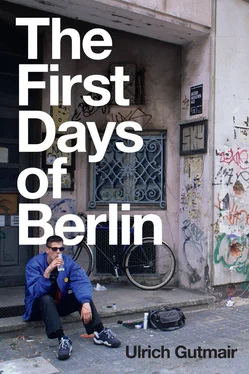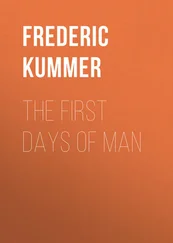211 200
212 201
213 202
214 203
215 204
216 205
217 206
218 207
219 208
220 209
221 210
222 211
223 212
224 213
THE FIRST DAYS OF BERLIN
The Sound of Change
Ulrich Gutmair
Translated by Simon Pare
polity
Originally published in German as Die ersten Tage von Berlin. Der Sound der Wende © 2013 Klett-Cotta - J.G. Cotta’sche Buchhandlung Nachfolger GmbH, Stuttgart. English edition published by arrangement with Michael Gaeb Literary Agency
This English edition © Polity Press, 2021
The translation of this work was supported by a grant from the Goethe-Institut

Polity Press
65 Bridge Street
Cambridge CB2 1UR, UK
Polity Press
101 Station Landing
Suite 300
Medford, MA 02155, USA
All rights reserved. Except for the quotation of short passages for the purpose of criticism and review, no part of this publication may be reproduced, stored in a retrieval system or transmitted, in any form or by any means, electronic, mechanical, photocopying, recording or otherwise, without the prior permission of the publisher.
ISBN-13: 978-1-5095-4731-9
A catalogue record for this book is available from the British Library.
Library of Congress Control Number: 2021938641
The publisher has used its best endeavours to ensure that the URLs for external websites referred to in this book are correct and active at the time of going to press. However, the publisher has no responsibility for the websites and can make no guarantee that a site will remain live or that the content is or will remain appropriate.
Every effort has been made to trace all copyright holders, but if any have been overlooked the publisher will be pleased to include any necessary credits in any subsequent reprint or edition.
For further information on Polity, visit our website:
politybooks.com
For Tal and Amalia
My heartfelt thanks to everyone who told me their stories and also to those who contributed their memories but were not named in the text: Bettina Ellerkamp, Florian Zeyfang, Jörg Heitmann and Jutta Kunde.
I also owe a debt of gratitude to Alexandra Corell, Annette Maechtel, Gabriele, Hannelore and Werner Gutmair, Henriette Gallus, Martin Hossbach, Maximilian Dorner, Micz Flor, Ronald Düker, Silvan Linden and the folks from Sourcefabric.
Preface to the English Edition
Some thirty years ago, Berlin was a sleepy place, detached from the rest of the world. Long gone were the days when the city was the most powerful industrial centre in continental Europe; a metropolis, birthplace of artistic avant-gardes, battleground for political ideas, welcoming place for revolutionaries of all kinds. The Nazis had exiled most of the artists, many of whom were Jewish, who had made Berlin a vibrant, hypermodern city. They had considered jazz to be ‘un-German’, and modern art to be ‘degenerate’.
On 2 May 1945, the Red Army finally conquered Berlin. The tyranny that caused the death of 50 million people in Europe, and was supported by some Germans until the bitter end, was over. The Cold War split the city into two halves. As a whole, Berlin found itself pushed from the centre of German culture to the periphery. What remained was the myth of those Golden Years.
The eastern part of the city came under Soviet administration. The socialist German Democratic Republic was founded and East Berlin became its capital. In 1961, the Wall was built to prevent East Germans from fleeing to the West. In the wake of the 1980s, this socialist state was broke and, ironically, kept alive for some more years through loans from West Germany. But the GDR was not able to reform itself. Its government was finally brought down by a peaceful revolution of its citizens. Similar revolutions took place in most of the countries in Eastern Europe, showing the world that people really have the power – if the ones in charge decide not to use rifles and tanks against them. On 4 June 1989, the Chinese government brutally crushed the democratic movement in Tiananmen Square. So when hundreds of thousands began to join the anti-government demonstrations in Berlin and Leipzig in the autumn of the same year, the fear that the East German Politburo would opt for the ‘Chinese solution’ was in the air.
After 1945 the Western part of Berlin was controlled by the Western Allies – the USA, the UK and France – and later became a part of the Federal Republic of Germany in the West. During the Cold War, the Western Allies considered West Berlin to be ‘the showcase of the Free World’ within the Eastern Bloc. Surrounded by the Wall, the enclave relied on subsidies from the West German government. Had it not been for the student revolt in 1967, the squatters’ movement, the young Germans who came here to avoid the draft, and artists like Einstürzende Neubauten, Iggy Pop and David Bowie, who loved the morbid charm of this grey and forgotten place, we would not have been able to say that anything significant happened here during the 1970s and 1980s.
When the Wall was opened by East German government officials, on the evening of 9 November 1989, the city slowly woke up again. The first days of reunified Berlin began.
This is a book about memory. When I started writing it, about fifteen years ago, I wanted to deliver a historical account of a short but formative transition period. In the year between the fall of the Wall and the reunification of the two states, a space of possibility had opened up. While many of the elder East Berliners were struggling to adapt to the new system, young people from Berlin and from all over the world had the economic and political freedom to realize their dreams, to create artworks and situations in a communal spirit. Houses were squatted, galleries were opened, basements were turned into clubs.
I had moved to Berlin from Bavaria to study history three weeks before the Wall fell. Now, I could study history in the making. I began to understand how revolutionary events actually disrupt and transcend its course. In those days, even the passage of time felt out of control. It seemed to speed up. Every day a new experience, every night a new sound. Rapid political change was followed by a fast transformation of city space. And paradoxically, it also seemed as though time stood still. Berlin-Mitte was an almost pastoral cityscape, a utopia in the true sense of the word. A non-place, in which the sound of the bass drum would set things in motion.
When we went out for a night of dancing in some makeshift club, sometimes we would reach a state of euphoria that, by definition, is the closest a living being can get to the eternal. Forgetting the past and the future, while getting lost in music, we would enter the magical time-space of absolute presence.
When I started to write this book and tried to fill the gaps in my memory, to reclaim my own history that did not find many references in the rapidly changing surroundings, I studied newspapers and books, and more significantly, I asked a variety of people to tell me their stories. This book is also their book, and I have tried to treat all those stories with respect while keeping the somewhat cruel distance you need to write truthfully.
I expected all the popular clubs, like Tresor or E-Werk, to be remembered, and eminent figures in the art and music scene to get the recognition they deserved. So I saw it as my duty to try and catch the ephemeral, to detect the zeitgeist in the lives of those who might be overlooked even though their presence and work were important in forming the culture of this temporary autonomous zone that shapes the image of Berlin to this day.
Читать дальше













